How To Check Your Credit Score For Free
Your financial life has many pieces, and credit is arguably among the most important. Accessing your credit score seems like it should be easy, but some methods require you to pay.
“What? Pay to see information about my credit habits? That’s unfair!”
Believe it or not, you never have to pay for your credit score if you know where to go. There are tons of ways to check it for free. Before we share those, however, let’s make sure you understand credit score and what goes into it.
What Is A Credit Score?
Credit score is a quantitative measurement of your creditworthiness. It’s essentially your credit history boiled down into a number. It’s not to be confused with your credit report, which is a report that lists all your credit accounts and information in great detail.
Fair Isaac Corporation, or FICO, provides one of the most widely used score calculation software, which is why FICO is mentioned in nearly any credit score discussion.
Your score holds great power over a significant portion of your financial life, influencing
- New debt eligibility (car loans, mortgages, personal loans, etc.)
- Credit card eligibility
- Interest rates
- Job opportunities in some industries
It’s determined by 5 factors, each one with a different weight:
- Payment history at 35% – Your history of on-time payments. Debt payments help and hurt your score, while certain bills like rent can only hurt your score if you fail to pay, but don’t boost your score if you pay on time.
- Credit utilization at 30% – How much you use credit, determined by your credit utilization ratio. Credit utilization ratio is total debt balance divided by total credit limit. Generally, you want to keep this ratio under 30% but not at 0%.
- Credit age/history length at 15% – How long you’ve been using credit. Calculated using your youngest account age, oldest account age, and average account age. The longer the history, the higher the score.
- Credit mix at 10% – How many credit accounts you have and how diverse they are. More accounts and more diversity implies more financial responsibility, meaning a higher score.
- New credit/hard inquiries at 10% – Applying for new credit slightly hurts your score through hard inquires, or formal looks at your credit by lenders.
There are 3 credit bureaus that aggregate your credit history information and use it to calculate your score:
- Equifax
- Experian
- Transunion
Each one receives slightly different information about your credit, causing your score to vary a little bit from bureau to bureau. Don’t fret; they’re never more than maybe 3 points apart.
Why Should You Check Your Credit Score Regularly?
As you already know, good credit is crucial to maximizing your financial success, yet it also takes a lot of time and dedication to nurture your score.
Anything that is crucial warrants regular check-ups especially if it takes a lot of time and effort to maintain, and your credit is no different. Think about it: your physical health is crucial to survival and therefore warrants regular checkups. Consider your credit score a vital part of your financial health.
There are several reasons to look into your score on a regular basis:
- Knowing your score – It never hurts to have your finger on the pulse of your credit score. You can take steps to improve or maintain it depending on where you are, and you can see how close you are to reaching credit score goals that’ll allow you access to better debt opportunities. After all, good credit takes years to develop, so you’ll want to be aware of your progress.
- Catch developing issues – Changes to your credit score are easier to catch when you check it regularly. For example, you may notice your card spending is through the roof and hurting your score. You can then take action to reduce credit card reliance before your credit card debt gets out of hand.
- Catch errors – Credit bureaus and lenders are both run by humans, and humans make mistakes. Unfortunately, these mistakes could hurt your score through no fault of your own. Check your credit score regularly to catch these errors and dispute them as soon as possible.
- Prepare for major loan applications – Major loans (such as mortgages) require the utmost in credit score AND usually require that score to stay as high as it is throughout the whole process. Monitoring your credit score as your shopping for a mortgage helps you catch issues early before they hurt your score enough for the lender to take back their offer.
- Be ready for better debt opportunities – If you’ve been eyeing an interesting credit card, you should also be regularly eyeing your credit score. The moment your score is high enough for that exclusive card, you’ll be ready to apply.
But do you have to pay for your credit score?
Not always, but who charges you for it?
The Fair Credit Reporting Act
The Fair Credit Reporting Act regulates lender/bureau access to your credit report and regulates how your information is collected. Unfortunately, it also allows the bureaus to charge
The bureaus each are required to offer one free copy of your credit score a year that can be obtained from annualcreditreport.com, but you have to pay for any scores/reports beyond that in the same 12-month period.
Once a year is not often enough to keep regular tabs on your credit score. You’ll have to seek out ways to obtain your credit score for free.
And you’re in luck, because there are plenty.
Checking Your Credit Score Is Free If You Know Where To Look
Finding companies/sites that’ll give you a free credit score whenever you want isn’t super difficult, but you do need to know where to look as well as any terms/conditions you must follow to use those sites.
We’ve compiled some of the best places to check your credit score for free so you don’t have to seek them out yourself.
Oh, and don’t worry: checking your credit score with any of the following sites does NOT count as a hard inquiry, but rather a soft inquiry. Soft inquiries neither appear on your credit report or affect your score in any way, so check your score to your heart’s content!
Credit Journey
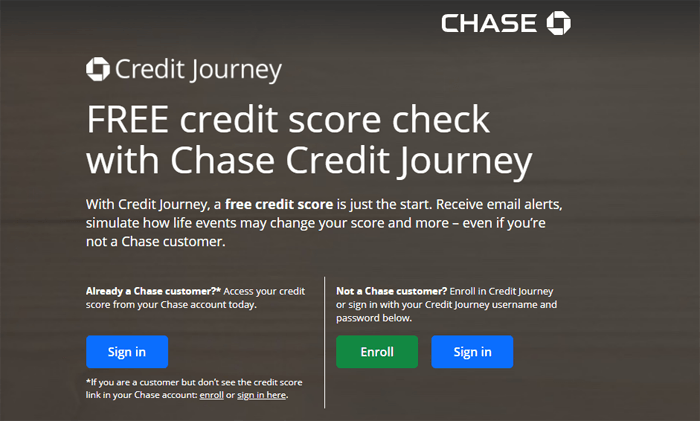
Credit Journey is Chase’s free credit report service. It pulls in your TransUnion report to create your score and it displays it in a neat circular format. You can also see the next date your score will be updated right below your score number.
They’ll alert you to any major credit report changes like hard inquiries. That way, you’re informed asap in case errors or fraud shows up on your report.
Credit Journey’s got some other cool features, like their credit score simulator (see what happens to your score if you do something, such as pay off a credit card), tons of educational resources/advice, and even a detailed yet concise dispute guide for those times that you DO catch errors on your report.
If you’re a Chase customer, you already have access to Credit Journey through your Chase online or mobile banking login. But if you aren’t, you can create a Credit Journey account without becoming a Chase customer completely free.
Credit Karma
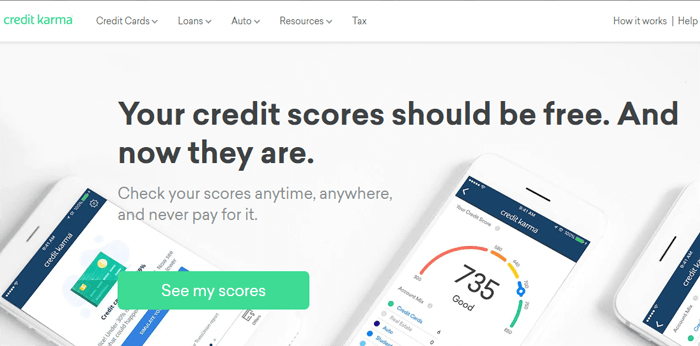
Credit Karma is one of the most renowned credit reporting sites on the net. Once you create an account and log in for the first time, you’ll see why people love it so much.
Both your TransUnion and Equifax scores are displayed right at the top of the main page. You can view how you’re doing with each of the 5 factors in great detail. Click “View Details” and you’re taken to a page that tells you the status of each factor, specific numerical targets to hit, advice/things to know, and specific details on each transaction that affected the factor in question.
You can also view your credit report on Credit Karma as well.
Credit score reporting is only the beginning. Credit Karma has a massive drop down list of resources consisting of
- Identity monitoring services – Toggle credit protection, view data breach info as it pertains to you, other advice.
- Unclaimed money – Money you may be entitled to that you weren’t aware of. Credit Karma will search state government databases to see if you’re legally entitled to any unclaimed money.
- Several calculators – Amortization, Debt Repayment, Mortgage Refinance, Simple Loans.
- Credit score simulator – This will help you figure out what you need to do to improve your credit score.
And too many more to list. Browse their site to get a better idea of just how much content they offer.
They even have a blog if you’re looking to learn more about credit score and news updates in the finance and credit worlds.
CreditWise
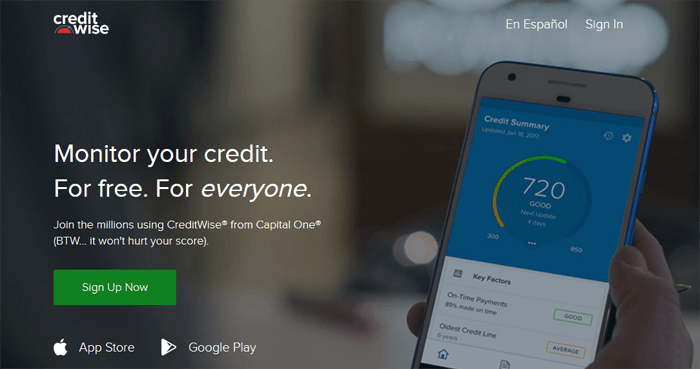
CreditWise is Capital One’s free credit report service. Like Chase’s Credit Journey, you don’t have to be a Capital One customer to take advantage of CreditWise. Also, like Credit Journey, CreditWise calculates your score based on your TransUnion credit report, which is prominently displayed at the top of the screen.
To be honest, the features offered a quite similar experience to Credit Journey’s, although we will say CreditWise wins in the looks department. The UI is very easy on the eyes and simple to navigate. Each factor impacting your score is displayed loud and clear below your score, as well as a short description of each factor.
And since CreditWise pulls in your TransUnion report, you can view your TransUnion report right on the site. Very helpful for catching errors.
Overall, CreditWise is another excellent choice of free credit reporting service.
Discover
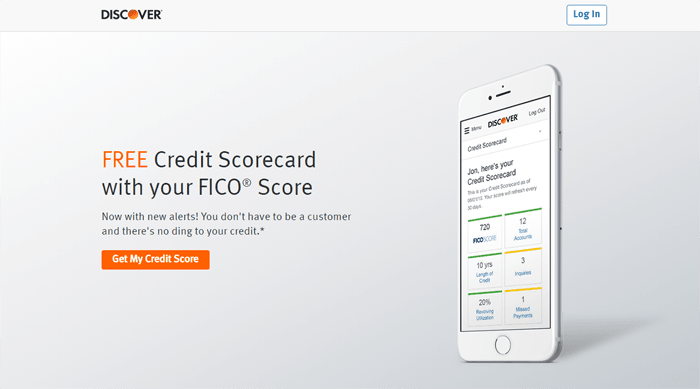
Discover has its own free credit report service, and like its colleagues CreditWise and Credit Journey, anyone can sign up regardless of Discover customer status. However, unlike those two, it uses your Experian score.
You’ll receive your free credit scorecard, which has mostly the same information as similar services, just arranged differently.
One distinct feature on the scorecard is the comparison feature at the left of the scorecard. A little graph shows you how your FICO score stacks up against the national average by age. Gives you that little motivational boost to build your credit if you’re below average or maintain it if you stand tall above everyone else.
Sadly, you can’t investigate the nitty-gritty details of each credit account. You’ll have to look at your official annualcreditreport.com for that information. But other than that, there’s no catch, despite what you may have thought about a free credit reporting service anyone can use.
One of the things we like to use discover for is looking at the factors that might be causing a credit score drop so that you can fix these things.
Mint
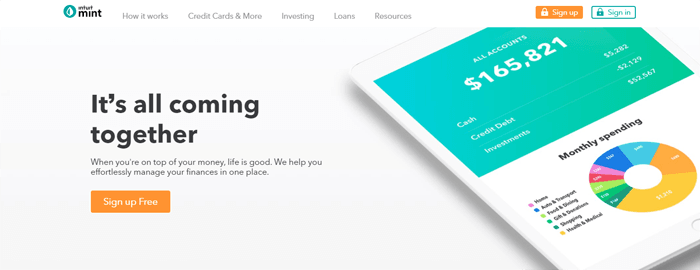
Mint’s one of the best personal finance services out there, having both an amazing website and a surprisingly useful mobile app.
It’s known for helping to automate budgeting and tracking everything related to your finances, and credit score gets its own section. Mint pulls in your credit information from your report and calculates your score based on a calculation model developed by Equifax, rather than going the FICO route. Because of this, it’s not 100% true to what the bureaus say, but it’s never more than a few points off.
Mint doesn’t just tell you your score, though; it gives you a detailed breakdown of each factor, telling you how well you’re doing in each category and how to improve (or just encouraging you if the factor is maxed out). They also tell you how each factor impacts your score, and you can even see individual transactions and other data that have impacted your particular performance in each factor by clicking “View Details”.
Mint is funded through advertising, but they work it into your credit score area well. They’ll put a button somewhere in the list of factors to check out their favorite cards, many being pretty good.
Side note: there’s a 6th factor in Mint called Derogatory Marks, but since derogatory marks stem directly from failure in the other factors, it’s not considered one of the 5 factors that impact score.
While you’re at it, you should consider using Mint regularly to monitor the rest of your finances. It truly lets you integrate your entire financial life into one interface and does most of your budgeting for you.














































